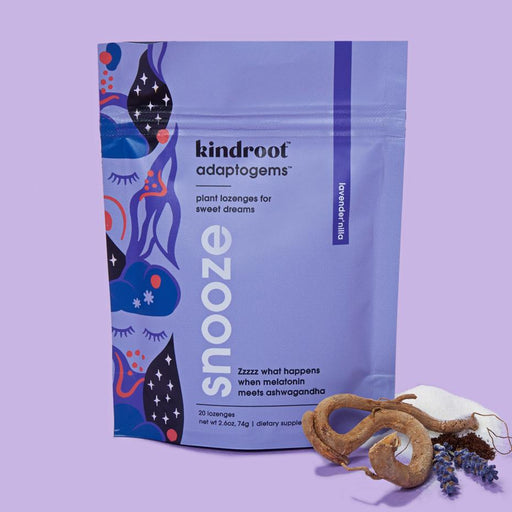You probably know that melatonin can help you sleep, but did you know it could also make you smarter? In fact, research shows that melatonin plays a role in cognitive function, learning, memory and protecting the brain. That's in addition to helping you get the sleep you need to promote intelligence and wake sharp and refreshed. Here's how melatonin contributes to healthy brain function.
Discover Kindroot Snooze: Melatonin + Ashwagandha Lozenges for Sleep
Contents
- How melatonin promotes intelligence
- Melatonin enhances sleep
- How sleep makes you smarter
- How much melatonin should you take to boost your brain
- Conflicting evidence
How melatonin promotes intelligence
Melatonin could make you smarter via multiple mechanisms.
Melatonin, the Ultimate Guide: Uses, Side Effects, Safety & FAQ
Promotes memory formation
Researchers at Tokyo Medical and Dental University in Japan found that melatonin and its metabolites could promote the formation of long-term memories and protect against cognitive decline (Neuroscience News).
That’s because the brain converts melatonin into N1-acetyl-N2-formyl-5-methoxykynuramine (AFMK) and N1-acetyl-5-methoxykynuramine (AMK), two metabolites that appear to play a role in memory.
10 L-theanine benefits, according to science
In one study, scientists found that younger mice that saw an object three times a day could remember it the next day, but older mice could not. However, when the older mice were given a single dose of AMK 15 minutes after seeing the object just once, they were able to remember it four days later. If melatonin was blocked from being converted into AMK, none of the mice could form long-term memories.

All of this suggests that melatonin and its AMK metabolite could delay cognitive decline – and potentially treat Alzheimer's disease – though more research is needed to confirm its efficacy for humans.
Melatonin Deficiency: Symptoms, Causes & Treatment Options
Prevents memory loss
Melatonin might also prevent memory loss – in particular, memory loss caused by sleep deprivation – and be an effective treatment for mild cognitive impairment.
"Studies show that melatonin supplements can alleviate memory loss and learning issues caused by acute sleep deprivation. In other words, when cognitive functions are negatively affected by poor sleep quality, melatonin can help improve the situation," says Dr. Po-Chang Hsu, M.D., a medical content expert at Sleeping Ocean whose specialties include neurology, pediatrics and neonatology.
How melatonin boosts immunity, according to experts

"Melatonin is also believed to alleviate memory impairment caused by Alzheimer's disease. Thus, melatonin supplements can potentially slow down the degenerative alterations of the brain. However, this subject requires further studies."
The best melatonin supplements, according to doctors
Protects the brain
Melatonin may help protect the brain as a neuroprotector, antioxidant and anti-inflammatory.
Mitochondrial neuroprotector
Studies have shown that melatonin is a neuroprotector for mitochondria, which have been called the "linchpin of general intelligence." Healthy mitochondria are essential for brain function and cognitive abilities (National Library of Medicine).
Antioxidant and anti-inflammatory
"Melatonin is one of the strongest antioxidants, able to scavenge up to ten reactive oxygen and reactive nitrogen species. It is also an anti-inflammatory," says Dr. Catherine Darley, ND, founder of the Institute of Naturopathic Sleep Medicine.
Does melatonin help with anxiety? See what doctors say
Research has shown that antioxidants are neuroprotectors and can prevent cognitive impairment. Moreover, inflammation is linked to cognitive decline, so anti-inflammatories could help delay loss of cognitive abilities.

"Melatonin can help protect the brain, especially when it comes to oxidative damage, because it enhances detoxification by stimulating antioxidant enzymes," explains Dr. Hsu. "Melatonin also has anti-inflammatory properties, protecting the brain from inflammation and reducing tissue destruction."
Melatonin enhances sleep
Melatonin might also indirectly support intelligence by helping you get a better night's sleep, since good sleep promotes cognitive function.
Free Sleep Tracker: Track your sleep patterns & how they influence your day
“Generally, melatonin can help people maintain stable cognitive functions by aiding consistent sleep cycles," says Dr. Hsu. "This has to do with sleep's role in memory consolidation, ability to focus, reasoning, attention and learning."
In addition to cognitive stability, melatonin's sleep-inducing properties could help prevent conditions that lead to Alzheimer's disease.

"Melatonin acts locally in the brain to promote sleep. It is during sleep that our neuroglymphatic system, equivalent to the lymph system of the body, is most active and can clear the beta-amyloid proteins that build up during wakefulness," says Dr. Darley. "It's these beta-amyloid proteins that create the plaques found in Alzheimer's disease."
How sleep makes you smarter
"Healthy sleep supports different types of memory consolidation, including both declarative and non-declarative memory," says Dr. Hsu. "Sleep quality also affects the person's learning abilities, attention, reasoning and focus. Additionally, poor sleep may impair the person's ability to deal with new tasks, especially those that require motor coordination."
Best over-the-counter sleep aids: What doctors say

Indeed, many studies have shown that sleep makes you smarter:
- Sleep strengthens memories and "contributes to the process of gaining insight, making connections and integrating large amounts of information" (National Library of Medicine)
- Sleep enhances cognition (National Library of Medicine)
- Sleep helps learning, memory and creativity. One study found that students who napped long enough to enter REM sleep tested 40% better than other students (Harvard Medical School)
- Sleep enhances focus and plays a role in memory consolidation that's essential to learning (Harvard Medical School)
- During sleep, our brains find hidden relationships between memories and solve problems posed during waking hours (Scientific American)
Study after study shows that sleep enhances intelligence. It stands to reason that melatonin can make you smarter by helping you fall and stay asleep.
Kindroot Snooze: Melatonin Lozenges Made with Natural Ingredients
How much melatonin should you take to boost your brain?
Dr. Darley explains that melatonin doses for cognitive function differ from therapeutic doses for sleep. She recommends starting with a low physiologic dose of 0.3 to 1.0 mg to maintain normal early mid-life melatonin levels. Dr. Hsu recommends starting at 1 mg, then increasing it if it doesn't help with sleep.
Unisom VS. Melatonin: Which is best for sleep?

Read: How to use melatonin for jet lag: What sleep coaches say
Conflicting evidence
More research is needed to fully understand melatonin's role in intelligence, especially since some studies indicate that prolonged melatonin use could have a different effect.
"Several studies show that melatonin does more harm than good when it comes to memory. It can inhibit the formation of new memories (according to animal studies) and negatively affect long-term memory and learning by influencing the synapses in the hippocampus," says Dr. Hsu. "However, this regards prolonged melatonin use. Short-term supplementation still needs further investigation. It's also worth mentioning that some studies may involve daytime melatonin administration, while most people take it in the evenings before bed."
Read: Does melatonin cause nightmares and dreams?
Can melatonin make you smarter? Plenty of evidence suggests that melatonin could enhance cognitive function via multiple mechanisms, but there is also conflicting evidence for long-term use.
"It’s crucial to remember that the connection between melatonin and improved cognitive function requires further studies,” says Dr. Hsu. “Therefore, it’s best to consult one’s doctor before taking this supplement for both cognition and sleep.”
Disclaimer: The information stated in this article is for educational purposes only. The information stated is not intended to treat, diagnose or cure any disease, condition, or other physical or mental ailment of the human body. The desire to make any changes to one's dietary habits or supplementation should be consulted and discussed with a licensed medical professional.




